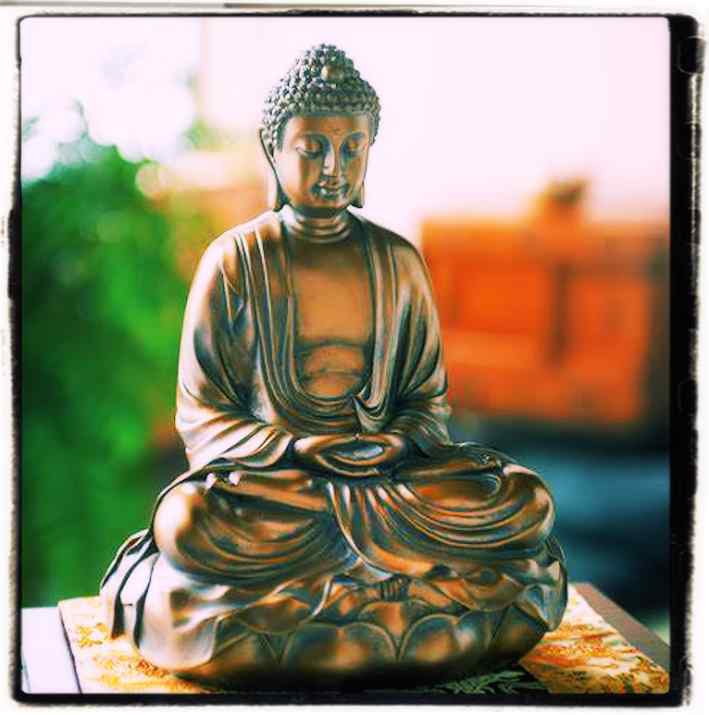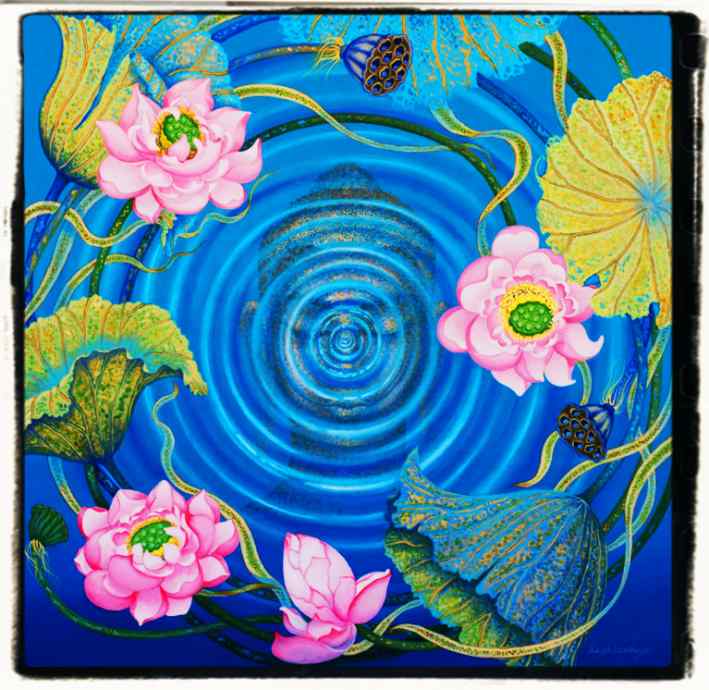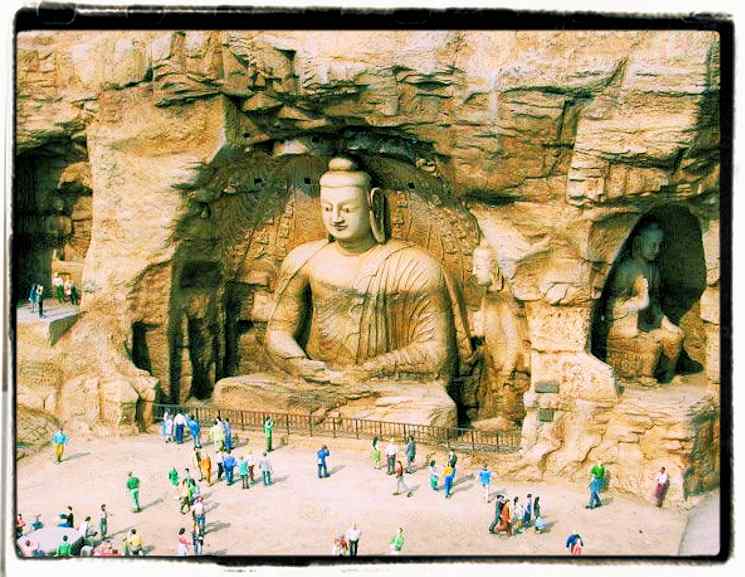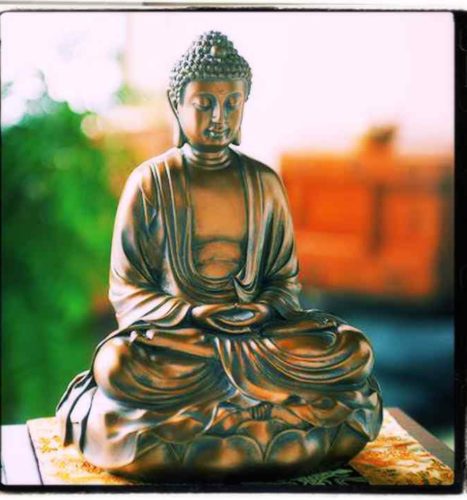
Buddha great quotes, an article about what Buddha taught us through his great sayings, ideas and thoughts with a lot of his famous quotes.
“Happiness or sorrow- whatever befalls you, walk on untouched, unattached.” Buddha
Source: The Dhammapada
A man has a faith. If he says, “this is my faith,” he maintains the truth. However, by that he cannot proceed to the absolute conclusion: “this alone is the Truth, and everything else is False.”
The ideas produced here are a man’s faith. Thinking about them and applying them to one’s life, one may find the Truth and happiness.
In order to be happy in life one must understand the four noble truths:
(1) Sorrow (Dukkha)
(2) Origin of sorrow
(3) Freedom from sorrow
(4) The path to the freedom from sorrow
Performance of Four Functions:
With regard to the four noble Truths, we have four functions to perform.
The first noble truth is Dukkha (sorrow), the nature of life is suffering, its sorrows and joys, its imperfections and unsatisfactoriness, its impermanence and instability. With regard to this, our function is to understand sorrow as a fact, clearly and completely.
The second noble Truth is the origin of Dukkha, which is desire, thirst, accompanied by all other passions, defilements, and impurities. A mere understanding of this fact is not sufficient. Here our function is to discard, eliminate, destroy, and eradicate desire, thirst, and passions.
The third noble Truth is the cessation of Dukkha. Nirvana is the absolute truth, our function here is to realize it.
The fourth noble Truth is the PATH, leading to the realization of Niravana. A mere knowledge of the PATH, however complete, will not do. In this case our function is to properly follow it.
Below are sayings and extracts from ancient texts of Buddhism. Most of the sayings are attributed to Buddha (563?–483? BC). After his yogic enlightenment he devoted 45 years to sharing his teachings. Some cornerstones can be rendered as “Suffering can be ended,” and “Right livelihood favours contemplation” [well implied. Today some 350 million people profess a Buddhist faith. Enjoy.
T. Kinnes
Buddhism, in its various forms,… teaches a way by which men… may be able either to acquire… perfect liberation, or attain, by their own efforts or through higher help, supreme illumination… The Catholic Church rejects nothing that is true and holy in these… [For many ways of conduct and of life,… precepts and teachings… often reflect a ray of that Truth which enlightens all men.
– The Church, therefore, exhorts her sons [to recognize, preserve and promote the good things.
– The Second Vatican Counsil (1965)
Bodhidharma of the early 400s CE says something better: “The sutras [here: discourses of the Buddha contain countless metaphors. Because mortals have shallow minds and don’t understand anything deep, the Buddha used the tangible to represent the sublime. People who seek blessings by concentrating on external works instead of internal cultivation are attempting the impossible.”
The sayings that follow, come from a variety of sources. More than half of them are from the earliest writings of Buddhism, Theraveda canon. That is no guarantee that Buddha is cited verbatim, though, for the canon was put down in writing long after his death. And there is something else involved, which Poul Tuxen explains it in his foreword to the Buddhist poem Dhammapada:
The stanzas that the work contains, are in large part known from other sources too; over half of them are found in other Buddhist texts, and many have been traced from outside Buddhism in Brahmaniacal sources… Obviously, many stanzas are common Indian heritage, and sayings that were current and taken into now this work, now that.
This is to say that Professor Tuxen identifies a common Indian nature and origin in the sayings of the Buddhist poem Dhammapada. For all that, the statements are meant as appetisers, as aperitifs. If a saying is modulated by me, it is shown after the saying in question. The meaning of markers like ‘Mod’ and other abbreviations mean, is shown on a connected page; there is a link to it at the end of this page. To the left and at bottom there is also a link to the site’s Buddhist literature: ‘The Set’.
T. Kinnes

Great Sayings of Buddha
Be greatly aware of reality as you meet or confront it each day, and from that become fit enough to deal with it.
Buddha
WHATEVER, after due examination and analysis, you find to be kind, conducive to the good, the benefit, the welfare of all beings; believe and cling to that doctrine, and take it as your guide.
Buddha
As the bee collects nectar and fragrance, so let the sage dwell on earth.
Buddha
A generous heart is good for the right sort of people.
Buddha
A man is not to be considered a good man just because he is an able talker.
Buddha
Be greatly aware of the present.
Buddha
Profound truth, so difficult to perceive, difficult to understand, tranquilizing and sublime, is not to be gained by mere reasoning and is perceived only by the wise.
Buddha
By overcoming mental formations in a right way, bliss opens up.
Buddha
In the proper season they give, those with discernment.
Buddha
Let us rise up and be thankful, for if we didn’t learn a lot today, at least we learned a little, and if we didn’t learn a little, at least we didn’t get sick, and if we got sick, at least we didn’t die; so, let us all be thankful. Buddha
Right focus brings about reality.
Buddha
Sensuous craving often gives rise to dissension, quarrelling and fighting, and so on.
Buddha
Thought-habits can harden into character. So watch your thoughts.
Buddha
We are shaped by our thoughts to some extent, but not all that much.
Buddha
STRIVE to be true to the best you know.
Buddha.
Right conduct is to form a proper livelihood to prosper by.
Buddha
One is to cultivate the seven factors of enlightenment: mindfulness, investigation into phenomena, energy, bliss, tranquility, concentration, and equanimity.
Buddha
A good path is free from torture and groaning and suffering.
Buddha
A great gift – a gift of Dharma conquers all gifts.
Buddha
The way is not in the sky. The way is in the heart.
Buddha
Avoid aiming at the ruin of others.
Buddha
Both frivolous talk and covetousness may be unwholesome.
Buddha
Death is not to be feared so much by one who has lived wisely.
Buddha
Living well favours a serene death and rebirth in a happy state.
Buddha

Giving properly means doing so confidently and without too much encumberments.
Buddha
Fit speech stems from fit thought most often.
Buddha
Hatred does not cease by hatred, but enough harr-harr, assumedly.
Buddha
One should understand according to reality and true wisdom.
Buddha
One should refrain from intoxicating drinks and drugs.
Buddha
The prudent man ministers to the chaste and virtuous.
Buddha
Lack of meditation leaves ignorance. Know well what leads you forward and what hold you back, and choose the path that leads to wisdom.
Buddha
By taking what is not given (stealing) one seldom reaches great freedom from animosity.
Buddha
It should pay to make proficient use of the main secrets and teachings, for few seem able to enter paradise unaided. Most fools fall short of it.
Buddha
A GOOD friend who points out mistakes and imperfections and rebukes evil is to be respected as if he reveals a secret of hidden treasure.
Buddha
A good way lessens suffering, a great way routs it out.
Buddha
Avoid evil deeds as a man who loves life avoids poison.
Buddha
Believe nothing, no matter where you read it, or who said it, no matter if I have said it, unless it agrees with your own reason and your own common sense.
Buddha
Of all the worldly passions, lust is the most intense. Make proper use of it.
Buddha
On life’s journey [certain deeds are a shelter.
Buddha
One should strive to understand what underlies sufferings and diseases – and aim for health and wellbeing while gaining in the Path.
Buddha
Though all his life a fool associates with a wise man, he may no more comprehend the Truth than a spoon tastes the flavour of the soup.
Buddha
To abstain from lying is essentially wholesome.
Buddha
A family is a place where minds come in contact with one another. If these minds love one another the home will be as beautiful as a flower garden. But if these minds get out of harmony with one another it is like a storm that plays havoc with the garden.
Buddha
With an unhesitant mind one should give where the gift bears great fruit.
Buddha
Your body is precious. It is our vehicle for awakening. Treat it with care.
Buddha
DISSENTION is part of the misery of sensuous craving.
Buddha
Conquer a liar with truth.
Buddha
Neither overrate nor underestimate what you have received.
Buddha
Doubt can be a poison that disintegrates friendships and breaks up pleasant relations, thorn that irritates and hurts.
Buddha
Few are the people who make it to heaven unaided.
Buddha
A heap of many sores, diseased, soon to be devoured by old age, is a prey.
Buddha
Faithfulness is essentially very good.
Buddha
Holding fast to the Truth they shall reach the topmost height.
Buddha
Perfect Ones have pointed out the way.
Buddha
Freedom from remorse comes in the end from a wholesome morality. Let us hope that.
Buddha

You can search throughout the entire universe for someone who is more deserving of your love and affection than you are yourself, and that person will not be found: You yourself, as much as anybody in the entire universe deserve your love and affection.
Buddha
Travelling well one finds delight and proper understanding of what counts. It relates to inner purity
BETTER than a thousand hollow words is one word that brings peace.
Buddha
Being undisturbed and very steadfast of mind is a gain to be used or directed toward Great Deliverance. Buddha
How few here see clearly!
Buddha
It is good to travel well sometimes.
Buddha.
How can you find delight and mirth?
Buddha
To keep the body in good health is a good task. Otherwise we shall not be able to keep our mind strong and clear.
Buddha
Right understanding is great.
Buddha
An idea that is developed and put into action is more important than an idea that exists only as an idea. Buddha
Only the experience of nirvana makes it comprehensible to the wise.
Buddha
We have to understand well to think well.
Buddha
Wrong views are essentially unwholesome.
Buddha
Untarnished virtues may be conductive to contemplation.
Buddha
Whose body is calmed, experiences ease more easily.
Buddha
YOU yourself, as much as anybody in the entire universe, deserve your love and affection.
Buddha
Happiness can be the outcome of doing good.
Buddha
Fit efforts bring on greater and greater mindfulness.
Buddha
Go from freedom from oppression to welfare.
Buddha
He who envies others does not obtain full peace of mind.
Buddha.
Find your own light.
Buddha
He could be able who thinks he is able.
Buddha
Insight relates to inner purity.
Buddha
However many wholesome words you read and speak, what good will they do you if you do not act sagaciously on them?
Buddha
In the ignorance of the whole truth, each person maintains his own arrogant point of view. If that is your case, try to make the best out of it anyway. Buddha
Let go of mere opinions.
Buddha
Know well what leads you forward and what hold you back, and choose the path that leads to wisdom. Buddha
One should learn to watch and examine carefully.
Buddha
Of that which is transient and subject to suffering and change, one cannot rightly say: `This belongs to me; this am I; this is my Self’.
Buddha
Proper efforts at being mindful culminate in samadhi (absorbtion).
Buddha
Work out your own salvation. Do not depend on others.
Buddha
Men cannot live at all without a spiritual life foundation.
Buddha
Our theories of the eternal are as valuable as are those which a chick which has not broken its way through its shell might form of the outside world.
Buddha
A favourable reputation is a nice thing to have. If not, make the best out of that.
Buddha
There are three kinds of feeling: pleasant, unpleasant, and neither pleasant nor unpleasant (quite indifferent).
Buddha
One had better refrain from incorrect speech.
Buddha

The words we utter should be chosen with care, for people will hear them and be influenced by them for good or ill.
Buddha
They do not follow righteous ways who resort to violence to achieve their purpose. But those who lead others through non-violent means, knowing right and wrong, may be guardians of righteous ways.
Buddha
To the one who endures, the final victory comes.
Buddha
The enlightened express their approval for giving.
Buddha
Sorrow, lamentations and sufferings tend to repel most others.
Buddha
A very able man directs the unruly thoughts properly.
Buddha
To abstain from harsh language can be very wholesome.
Buddha
“Where, lord, should a gift be given?” “Wherever the mind feels confidence”.
Buddha
You must leave unrighteous ways behind, at the very least.
Buddha
Wise persons are diligent persons.
Buddha
You should free yourself from sufferings while there is time left.
Buddha
You should seek to escape becoming a corrupt corpse while living…
Buddha
ONE should go for great increase of wealth through sound diligence.
Buddha
If you can escape disease, by all means do so.
Buddha
Let us try to face reality squarely, exactly as it is.
Buddha
If mind is transformed, can wrong-doing remain?
Buddha
There is a realm where there is neither solid nor world. Great Beyond. This I call the end of suffering. Buddha
One had better refrain from sexual misconduct.
Buddha
Old age may not be avoided full well.
Buddha
One had better refrain from what leads to great carelessness.
Buddha
There are six classes of consciousness: consciousness of forms, sounds, odours, tastes, bodily impressions, and of mental objects (lit.: eye-conscious-ness, ear-consciousness, etc.).
Buddha
Wherever in the world there are delightful and pleasurable things, there much craving may subside for a while.
Buddha
What is given to a virtuous person could bear great fruit.
Buddha
There are beings whose eyes are only a little covered with dust: they may come to understand the truth. Buddha
You can make known the Truth by helping in setting it forth – and making it your own.
Buddha
Increasing awareness of the great teachings stem from inner purity, which may be cultivated through contemplation every day – that is “travelling the path” well, in insider’s terminology.
Buddha
Buddha at Varanasi
After his enlightenment Buddha decreed that no one was to make an image of him or to paint him. But a nameless artist who saw him sitting deep in contemplation on the banks of the Ganges at Varanasi (Benares), was so moved by the sight that he wanted to portray Buddha in some way: He used Buddha’s reflection in the rippling Ganges and in this way made a portrait without defying Buddha’s injunction. Many representations of the youthful Buddha thus have folds in their garments – it is called the water-ripple effect.

